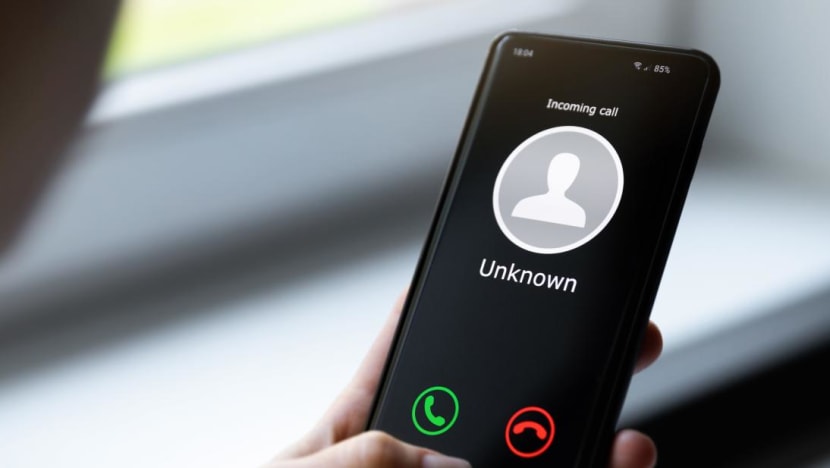Life savings wiped out in days: 75-year-old lost S$1 million to China official impersonation scam
More than 100 victims have lost at least S$14.6 million to scammers impersonating China officials since January.

A person receiving a phone call from an unknown number. (File photo: iStock/ronstik)
SINGAPORE: When 75-year-old Madam Fong (not her real name) picked up a call from an overseas number last December, she did not imagine that she would end up losing an eye-watering S$1 million to an elaborate scam.
The caller claimed that her name was being used in China for money laundering.
“They asked me to cooperate with them … so I agreed,” said the retiree.
Soon, “official documents” were delivered to her door, bearing the logos of government agencies such as the police, the Monetary Authority of Singapore and the Attorney-General’s Chambers.
Not long after, the scammers also delivered a mobile phone and SIM card, calling her thrice a day on a pre-downloaded app to check in.
They built a rapport over two months through light, friendly conversation – only after ensuring her family members were not at home.
Unbeknownst to Mdm Fong, a withdrawal request of S$1 million had been made from the retiree’s CPF account to her bank account, accessed via two-factor SingPass login. She could not recall how this may have happened.
She also visited a UOB bank branch to apply for Internet banking for the account, at the scammer’s instructions.
The money then began flowing out. From Jan 30 to Feb 3, the sum was disbursed to multiple local and overseas accounts in many S$50,000 transactions.
“They just asked me to transfer, but they did not give an explanation, (they) just wanted to accumulate the amount for later use," said Mdm Fong in an interview facilitated by the police.
“I thought they just wanted me to protect my family members,” she said, adding that scammers had said her husband and children could get involved.
She is one of at least 109 victims, who have lost a total of at least S$14.6 million since January this year to scammers impersonating Chinese officials.
On Mar 4, the police warned against the re-emergence of the scam type. They said then that there had been at least 46 victims, with losses amounting to at least S$12.3 million.
LIFE SAVINGS WIPED OUT IN A FEW DAYS
Describing Mdm Fong as disciplined, her husband said: “She never stepped one step out of the square ... The possibility that she could go to jail and die in jail, that’s what she was afraid of.”
He added that she also “wholeheartedly” believed the scammers were “friends” who were trying to help her solve the issue, as they had spent a long time building up the relationship.
When UOB flagged the case to the police’s anti-scam centre, officers visited Mdm Fong to speak to her – but she did not believe them.
The fact that she had been conned only sank in when she messaged them about what the police had said, but they did not respond.
Mdm Fong said later in Mandarin: “At first it sounded like (the scammers) made sense, but only after thinking, then I realised it couldn’t have been right.”
While speaking with the media, Mdm Fong also could not recall various details – which could have been due to the psychological impact of an injury from a few years ago, her husband said.
He added: “(This sum was) accumulated over 50 years, it’s life savings. For 50 years, you have to work day and night … And it’s wiped out in (a few) days.
“Not only is it just an issue of money, but also mental suffering. After this, I had so many quarrels with my wife and I kept on scolding her … because it is a big sum, it’s life savings.
“(We) struggled with so much blood and sweat to accumulate wealth for retirement and leave some for our children, but it’s gone.”
Mdm Fong's husband, who is in his late 70s, added: “Now over time, we are slowly getting over it and taking it as it is now. Whatever is gone is gone."
He said it is important for them to share their story because they “really don’t want the scammer to carry on to succeed”.
ADVICE FROM POLICE
The police said in an advisory on Mar 4 that overseas law enforcement agencies have no jurisdiction to conduct operations in Singapore, arrest anyone or ask members of the public to help with any form of investigation without the approval of the Singapore Government.
They also advised members of the public to beware of calls with the “+” prefix, which originate from overseas.
If you receive such calls, you should ignore them and the callers’ instructions, the police said.
They stressed that people should never share their Singpass and bank account login details and one-time passwords with anyone else, including family and friends.
“No government agency will instruct payment through telephone calls or other social messaging platforms (WeChat, WhatsApp or Facebook), or ask you for personal banking information such as your Internet banking passwords," the police said.
Recipients of such calls should also contact a trusted friend or relative before they act, authorities added. “You may be overwhelmed by emotion and may err in your judgment. Do not be pressured by the caller to act impulsively.”
Members of the public should report any fraudulent transactions to their banks immediately. For issues relating to Singpass, the helpdesk can be contacted at 6335 3533 or support [at] singpass.gov.sg (support[at]singpass[dot]gov[dot]sg).
A UOB spokesperson also said the bank's systems are secure, and reminded customers that scammers cannot access their funds as long as they do not share their banking details, passwords and one-time passwords.















